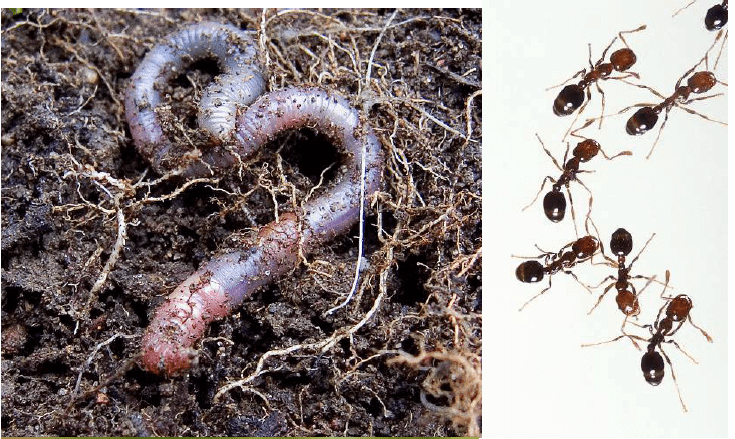NCERT Solutions for Class 6 Science - Garbage in, Garbage out
Ques 1:
(a) Which kind of garbage is not converted into compost by the redworms?
(b) Have you seen any other organism besides redworms, in your pit? If yes, try to find out their names. Draw pictures of these.
Ans :
(a) Non bio-degradable waste like pieces of synthetic cloth, polythene bags, broken glass, aluminium wrappers, nails and broken toys cannot be converted into compost by the redworms.
(b) Earthworms, small insects like ant, millipedes are found in pits
Ques 2: Discuss:
(a) Is garbage disposal the responsibility only of the government?
(b) Is it possible to reduce the problems relating to disposal of garbage?
Ans :
(a) Garbage Disposal is the responsibility of every citizen. If we continue to generate so much garbage, the spreading diseases will increase at large scale. Non-biodegradable waste like plastic, polybags also add also harmful factors to environment. We must ensure ways to reduce generation of garbage. Wherever possible, we must use recyclable material in our daily use.
(b) Yes, it is possible to reduce the problems relating to disposal of garbage to a large extent. We should use those materials which are recyclable and avoid or reduce the use of non-biodegradable materials. While throwing out garbage in trash can, we should separate biodegradable waste from non-biodegradable and throw them in separate bins.
Ques 3:
(a) What do you do with the leftover food at home?
(b) If you and your friends are given the choice of eating in a plastic plate or a banana leaf platter at a party, which one would you prefer and why?
Ans :
(a) Preserve them in refrigerator and use them before they get spoiled.
(b) Banana leaf is a better choice. It is bio-degradable and can be disposed easily. On the other hand, eating in plastic plate is not good as plastic is non-biodegradable, it will not dispose-off easily.
Ques 4:
(a) Collect pieces of different kinds of paper. Find out which of these can be recycled.
(b) With the help of a lens look at the pieces of paper you collected for the above question. Do you see any difference in the material of recycled paper and a new sheet of paper?
Ans :
(a) Most of the papers available in market are recyclable i.e. newspapers, notebook, magazines, paper sheets, envelopes etc.
 Fig: Magazines
Fig: Magazines
(b) The difference between new sheet and recycle paper is quite clear. Usually handmade recycled paper is of rough quality.
Ques 5:
(a) Collect different kinds of packaging material. What was the purpose for which each one was used? Discuss in groups.
(b) Give an example in which packaging could have been reduced?
(c) Write a story on how packaging increases the amount of garbage.
Ans :
(a) Different kinds of packaging materials used commonly are:
Cardboard - used as shoe box.
Plastic Bags - Toys covers, sarees bags, shopping bags, etc.
Wooden Boxes - Fruit baskets and boxes for hardware.
Jute Bags - School bags, shopping bags, vegetable bags, etc.
(b) By reusing the packaging material, we can reduce packaging material.
(c) The basic purpose of packaging is to protect the product from tampering and to maintain its freshness. However, most of the packaging material is used to beautify the boxes and make them look attractive on the shelves. Unfortunately a large volume of packaging material goes waste and is thrown into dustbin. For example, in most of the places, the dustbins are full of chips and biscuits wrappers. It unnecessarily increases the amount of garbage. It also increases the cost of the product due to unnecessary packaging. We should seriously consider how to reduce unnecessary packaging.
Ques 6: Do you think it is better to use compost instead of chemical fertilizers? Why?
Ans : No doubt compost is better to use than chemical fertilizers due to following reasons:
- Compost is much easier to prepare.
- Compost is environment friendly whereas fertilizers can harm our health and the environment.
- Compost does not pollute our environment.
- Compost decomposes bio-degradable waste into natural soil. It conserves our environment.
|
137 videos|466 docs|217 tests
|
FAQs on NCERT Solutions for Class 6 Science - Garbage in, Garbage out
| 1. What is the meaning of the phrase "Garbage in, Garbage out"? |  |
| 2. Why is it important to properly dispose of garbage? |  |
| 3. What are the different methods of waste disposal mentioned in the article? |  |
| 4. How can we reduce the amount of waste we produce? |  |
| 5. What are the consequences of improper waste disposal? |  |
|
137 videos|466 docs|217 tests
|



















